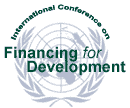
Department of Public Information - News and Media Services Division - New York
18-22 March 2002
 |
International
Conference on Financing for Development Department of Public Information - News and Media Services Division - New York |
|
| Monterrey, NL, Mexico 18-22 March 2002 |
20 March 2002 | |
|
|
|
At a press conference on the sidelines of the International Conference on Financing for Development, they said the Monterrey consensus should be about mobilizing resources to finance all those commitments. Instead, it failed to mention the issues that were of vital interest to the world's poorest countries, particularly debt cancellation and market access for least developed country goods. Arjun Karki, of Rural Reconstruction Nepal, said that more than 37 per cent of his country's expenditure went into debt servicing. Since the 1950s, Nepal had been borrowing funds in the name of poverty alleviation. The World Bank, International Monetary Fund (IMF) and bilateral agencies had dictated the terms for those loans, as well as the development agenda. And while they demanded good governance, they should also take responsibility for corruption, he said, stressing the need to reform the international financial architecture. Jean-Pierre Ouedraogo from Burkina Faso said that, as far as the least developed countries were concerned, there had been a consensus at the 2001 Brussels Conference on Least Developed Countries. The Monterrey outcome document added nothing to it. What did the Brussels commitments mean and how would they be financed? he asked. Huguette Bokpe Gnacadja from Benin said the NGO Caucus was tired of unfulfilled commitments. They had been made at the Rio United Nations Conference on Environment and Development (the Earth Summit), the Copenhagen Summit on Social Development, the Beijing Conference on Women, and at the Millennium Summit. Monterrey should be about immediate and concrete mobilization of resources because people were starving now, she emphasized. Elizabeth Eilor from Uganda welcomed the United States and European Union pledges to increase official development assistance (ODA), but that was simply not enough. Poverty still reigned in the least developed countries, children were still out of schools, people were still dying from preventable diseases, and communities were unable to feed themselves. Increased ODA was all very well, but other steps, such as debt cancellation, were needed to allow the least developed countries to pull themselves out of poverty, she stressed. Press Releases Conference News |